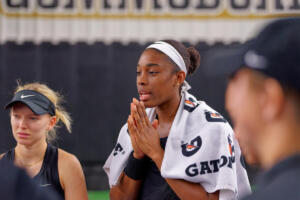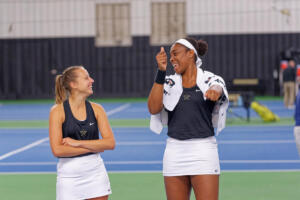World on Her Racket
by Graham HaysBy daring to grow at every turn, Célia-Belle Mohr steered a course from the south of France to Vanderbilt.
Célia-Belle Mohr’s first steps in tennis came with a gentle push: She didn’t so much choose to pick up a racket as accept the one placed in her hands by a loving mother.
But her path from being the child of a soccer player in the south of France to living, studying and playing SEC tennis in the home of country music was forged with steps of Mohr’s own making.
Urged on by her mom, who had long understood the power of sports to open up the world, Mohr crossed the ocean and faced a language divide to pursue her passion—embodying Vanderbilt’s mission of challenging herself and stepping beyond her comfort zone before she even arrived to take the place she’d earned on the women’s tennis team.
“The most important thing is to believe in yourself and not be scared about what people think about you,” Mohr said. “Just be bold, go to new places. I’m very curious and very bold in a certain way, so I’m not scared of changing my social environment. And I would say that for the new generation, it is very important to believe in yourself and have a lot of self-confidence.”

It was no surprise that Mohr ended up an athlete. Her dad was a swimmer. Her mom, who immigrated to France from Cameroon partly for better athletic training opportunities, played soccer. Mohr and her brother, who plays basketball, grew up around sports and internalized the lessons of discipline and time management at an early age.
Mohr also participated in judo as a young girl, but some of her earliest athletic memories are of playing doubles tennis matches with her mom at their local club and helping out at a tournament when the women’s professional tour came through town. Even her first brush with sporting disappointment, when French pro Caroline Garcia didn’t hear the youngster’s pleas for her gear after a match, couldn’t dampen her enthusiasm for the sport.
“I know that tennis can be very frustrating, but I love the fact that you need to be smart in the way you see the courts, how you see yourself on the court and your opponent,” Mohr said. “It’s just a love of reflection, tactics and even knowing yourself on the court. When I was little, I was just doing this for fun. But now that I grow up, I just understand this more. And I love everything about tennis, honestly.”
It was her family’s other great focus—academics—that brought Mohr to a crossroads as she neared the end of high school. Mohr and her brother were raised with a reverence for academic rigor. But in Europe, high-level sports and academics largely diverge by the time students attend university. It’s possible to do both, to train at a world-class level and pursue a university degree, but those paths can only ever be parallel, not complementary in the way they are in the American model. Mohr saw many French athletes choose to attend university in the United States, an option that increasingly appealed to her.
“The importance of education in my house was huge,” Mohr said. “I’m from immigrant parents, so having a good grade is very important because that’s how they view success in society, I would say. It was a lot of pressure, especially coming from an African mom, but it just, like, taught me how to be very efficient with myself.”
When Vanderbilt head coach Aleke Tsoubanos watched Mohr play in junior events in the United States, she had no doubts about the talent on display. Mohr was an imposing physical presence. She struck the ball purely, covered the court well and had an obvious mind for the game. The only thing the coach wasn’t sure about was the young woman’s interest in leaving home—let alone to undertake as uniquely challenging an athletic and academic opportunity as Vanderbilt. Fortunately, Mohr’s on-court attributes weren’t all that set her apart.
“A lot of the players at those tournaments are very pro focused, whether that’s going to be through college or not,” Tsoubanos said. “Her first interest was talking about being an entrepreneur and wanting to start her own business at some point … which I thought was very different than what you normally hear from kids at that age.”
Leaving behind all that is familiar is never an easy endeavor. Though Mohr’s family was fully supportive of her pursuing an education in the United States, coaches at home urged her to follow a more traditional route in France. Then the COVID-19 pandemic complicated matters further: Mohr could only make only virtual visits to campus. Underlying everything was the reality of operating at all times in English—a second language with which she didn’t yet feel fluent. Shy by nature off the court, even basic day-to-day communication created stressful and potentially awkward moments.
Perhaps most challenging of all, once she decided to take the plunge, she didn’t even have the familiar release of competing in meaningful matches while sitting out the 2021–22 season.
Adjusting to life as a student-athlete was a challenge on all fronts. She remembers feeling unsure of herself at times—of her voice, her surroundings, her confidence. Despite what could have been an intensely isolating experience, playing an individual sport thousands of miles from home, Mohr did more than persevere. She found ways to make those around her better by her sheer presence.
“She was always someone who inspired me,” senior teammate Anna Ross said. “If I’m in a match and I’m struggling or in a challenging moment, I’ll always look to CB. And I can always count on her to make me laugh or give that little inch of support.
“She was a huge factor in our success down the line last season. She was always in the group huddle, always very vocal. Even in our team meetings after we would play, she was always very respectful but would offer feedback where it’s needed. And she didn’t sugarcoat things. I think without that, we wouldn’t have been able to grow like we did.”

Mohr also began to find what she was looking for off the court—the intellectual stimulation and learning opportunities that helped her decide to come to the United States in the first place. In an audacious move for someone whose daily life was pretty much a foreign language course, she took and thoroughly enjoyed Chinese. (In fact, it’s now her minor.) She loved a data science course. And she found likeminded classmates fascinated by new realms of finance, which led to her joining a blockchain club.
“We are just a bunch of like young people who are passionate about learning about blockchain, the new web and future technologies,” Mohr said. “I’ve always liked this, since I was probably 15, but this gave me the opportunity to learn more about it because people were actually very experienced in this field. I got the opportunity to make friends and talk about something we’re all passionate about.”
She is intrigued by the prospect of one day working with internet privacy. A product of the social media age, Mohr is acutely aware of the danger of losing our private lives amid the tools and apps that connect us. Whether her future after tennis lies somewhere in that realm—or perhaps fashion, another interest, or anything else—those closest to her are certain she will approach her future the same way she approached Vanderbilt: by going all in.
“I see this powerful woman, CEO-esque, just taking the world and saying, ‘Let’s go.’” Ross said of Mohr’s prospects. “She is a go-getter. She has a self-belief that is contagious. When I look at her in 10, 20, 30 years, I see her just being super successful in whatever she puts her mind to—and being a great leader wherever her road takes her.”
For now, though, tennis is at the forefront. Through Feb. 27 Mohr had overall records this season of 18-9 in singles and 18-3 in doubles, including 10-1 when paired with Anessa Lee.
“She has a wonderful game to begin with,” Tsoubanos said. Something “we’ve talked about her getting better at is more of a physical presence forward in the court. She has such good groundstrokes and such a great serve, that she often gets a lot of short balls and points early. So it’s just the willingness to come forward and play in the front court a little more—and maybe even approach the net and get more comfortable up there because she is so good from the back. And she’s done that. She’s done great.”
Mohr’s willingness to grow as a player, and her ability to pull it off, shouldn’t be surprising. She welcomed and met numerous challenges just to be on the court as a Vanderbilt student-athlete. Only someone who was convinced of her chosen path would have embarked on the journey—let alone seen it through this far.
Though she needed a mother’s gentle nudge to pick up a racket all those years ago, she’s the one who used it to open up the world.
“One thing that really impressed me in recruiting her was she never feared the challenge of Vanderbilt and the excellence that we have here academically and on the court,” Tsoubanos said. “She never shied away from that. A lot of people can be intimidated by that, and she wasn’t. She was up for the challenge and up for the workload.”

